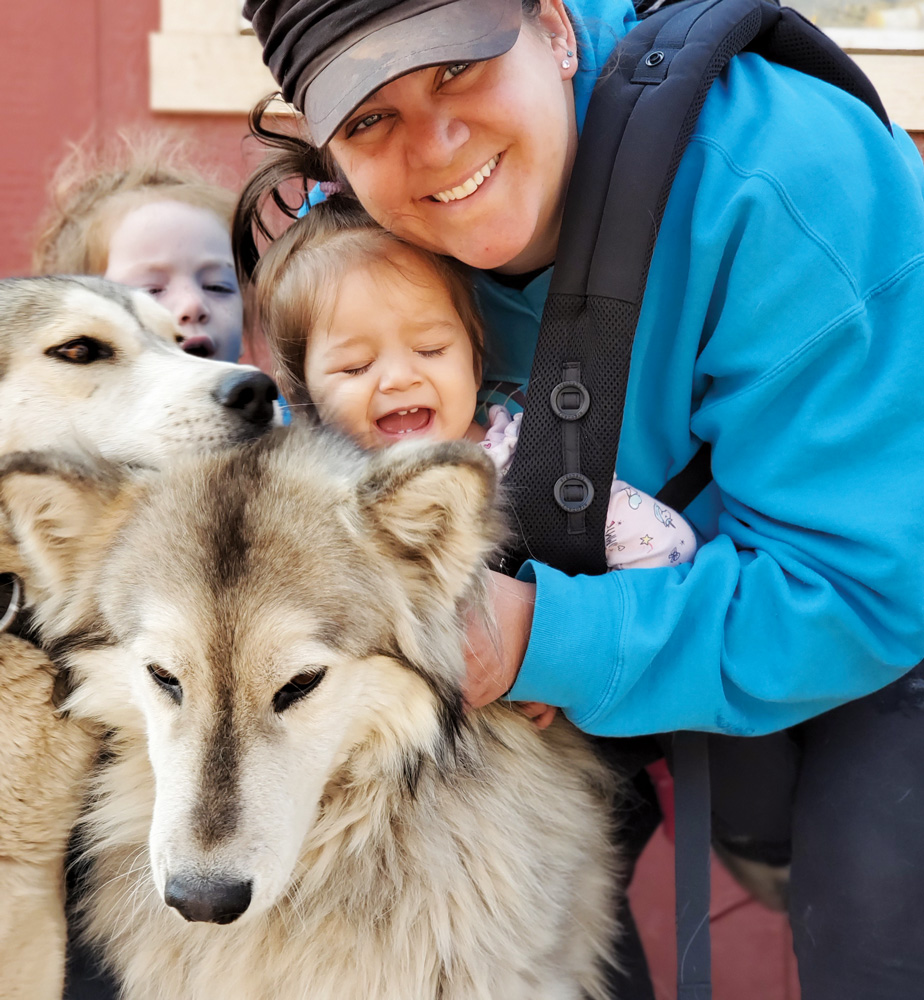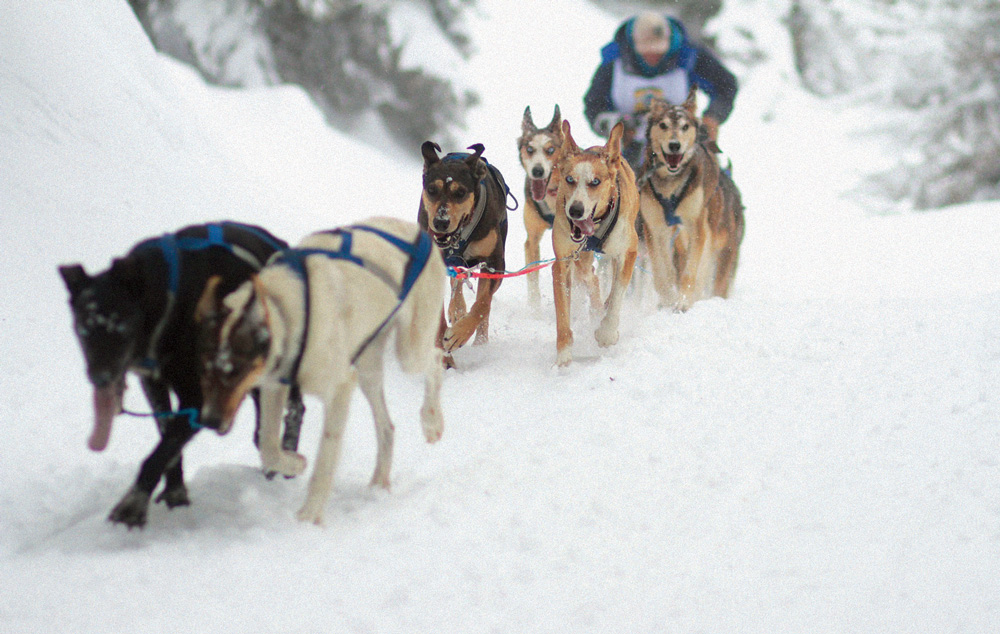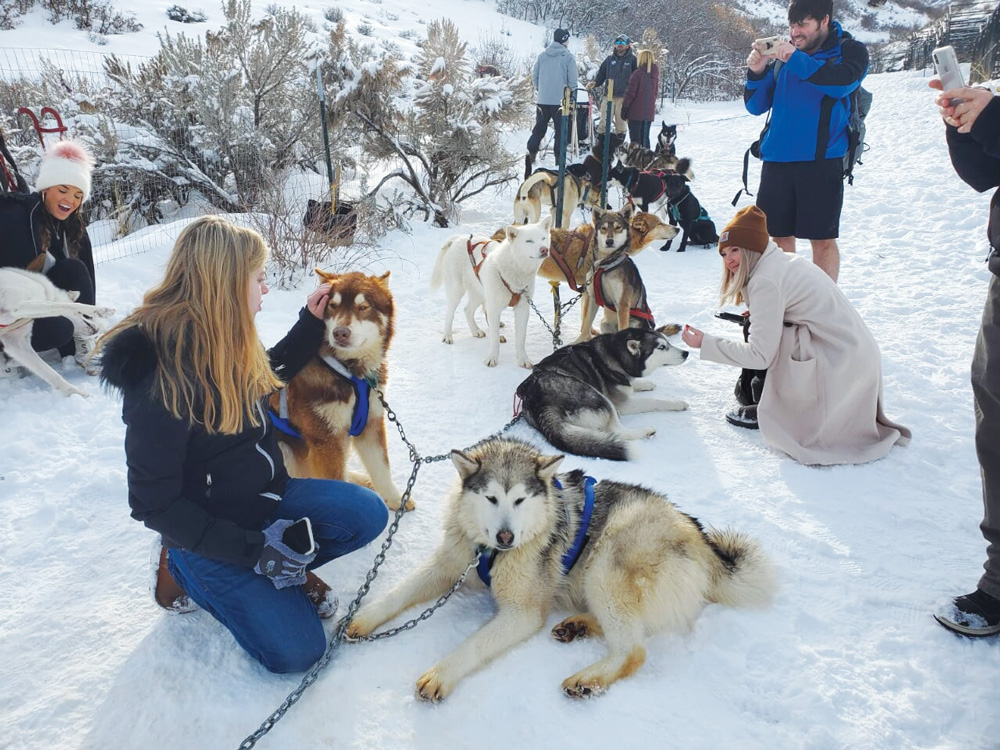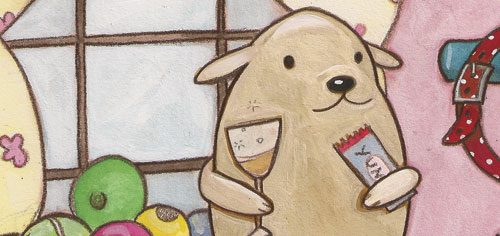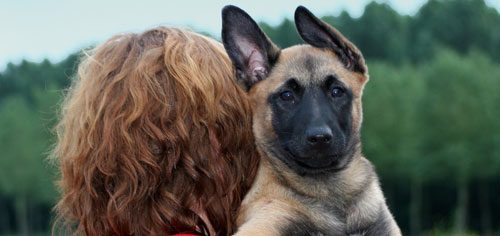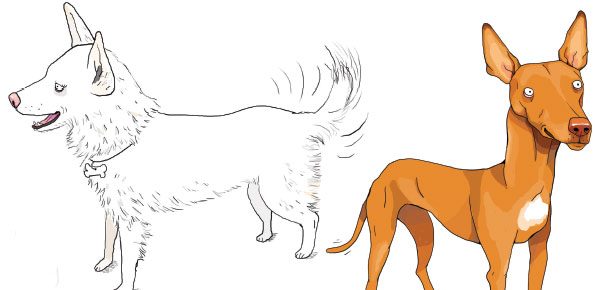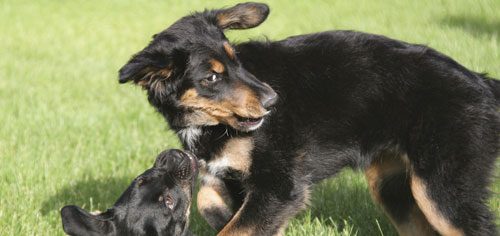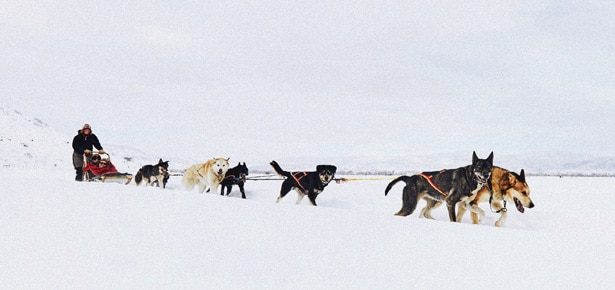
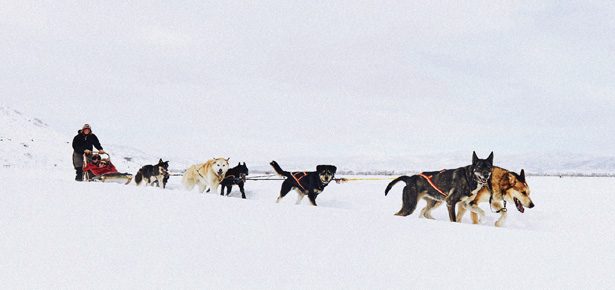
The “Bad News Bears” of Dog Sledding
With a pack comprised of rescues, this Utah couple is harnessing the power of dogsledding to transform the lives of surrendered, abandoned, and abused dogs desperately in need of a second chance
Twice every night, at three and five a.m., the husband-and-wife team behind Rancho Luna Lobos are gently awoken by 79 howling dogs, their yelps rising through the high-desert air like a chorus.
For Dana Ramirez, these calls of the wild are her favourite part of her day. “It’s the dogs’ way of doing a pack check—they also do it at nine p.m.—and they’ll keep singing until everyone has chimed in,” says Dana, who runs the rescue and rehabilitation centre, professional racing kennel, and educational dog sled tour business with her husband, Fernando. If just one dog is missing, or has recently passed away, the pack will cry all night long looking for him.
It’s apt, indeed, that Rancho Luna Lobos translates into Ranch of the Moon Wolves.
While most people wouldn’t look forward to having their sleep interrupted before an 18-hour work day, Dana, 33, and Fernando, 35, are not your average dog owners. From their mountainous 55-acre property in Peoa, Utah, just outside of Salt Lake City, the couple takes care of those 79 singing dogs—along with their own five children. They are fuelled by a deep-set passion for dogsledding as both sport and therapy, having seen first-hand the transformative rehabilitation effects it can have on neglected, abused, or disabled dogs.
It all began back when an eight-year-old Fernando took to the idea after watching Balto—a based-on-a-true-story movie about an outcast half-wolf, half-Husky who becomes a hero after leading a dog team across 600 miles of Alaskan wilderness to fetch medical supplies. Crafting a makeshift sled out of a plastic table and skis, young Fernando harnessed up his little yellow Lab, and successfully trained him as a lead dog. Watching their son’s passion manifest, Fernando’s parents enforced a rule: if he wanted to race, all the dogs needed to be rescues. So, he gathered up a team of underdogs, and started mushing.
Fernando’s professional scope eventually turned toward competitive running, and he left the dogsledding behind. Then, while training to try to make the Olympic marathon team, he met Dana. “One day we were driving around, talking about what our dream jobs would be, and he just said ‘Dogsledding. I would love to be a musher,’” she recalls. Surprised at first, Dana quickly sensed his earnestness. “So, we just went for it!”
Within a week they had not only assembled a team of sled dogs, but had established a theme for their kennel—taking in rescues. In 2010, Rancho Luna Lobos was born.
Initially, the couple sought out shelter dogs in need of a second chance, often the last stop for many of those animals. These days, they still work with animal control and shelters, but direct interest from people needing to rehome dogs has skyrocketed; Rancho Luna Lobos has an ever-growing wait list of dogs wanting to join the pack. Canines with any trace of Northern breed are accepted: from Lab-Husky mixes to high-content wolf mixes to Greyhound-Huskies, and everything in between, their rescues hail from all over the United States.
“He is not only incredible to watch,” says Dana, “but he is living proof that if you have disabilities or obstacles in your life, there is a way for you to achieve your goals and dreams.”
For the Ramirez’s, their primary goal is rehabilitation and a desire to unlock a sense of joy in these canine lives.
“A lot of these guys have been through some hard situations,” says Dana. “We use the dogsledding as their therapy.” The couple finds that, above all, Alaskan Huskies are particularly wired for the sport, showing a heightened endurance and recovery rate over most of the other breeds and mixes—not to mention the fastest speed—making them top contenders for their race team. With constant energy and drive to run, calming them down can be a challenge.
If a dog is given plenty of time to try the sport, but they don’t take to it, it is never a problem; the couple will take their time—sometimes up to five years—to find them a great home. For the ones that thrive on running, Fernando mushes the very best on their professional dogsledding team, which is currently ranked 12th in world, placing 12th at both the 2020 Pedigree Stage Stop Race in Wyoming and the 2020 World Championship Dog Race in The Pas, Manitoba.
From mid-December to mid-March, when the snow lays thick amongst the sage brush, scrub oak, and aspen trees, Rancho Luna Lobos offers junior musher and adult musher programs, and also offers highly interactive dogsledding that takes guests up and down the mountainsides of the scenic ranch. “We hold true to the athletic sport that it is,” adds Dana of this bucket-list experience. “You have to be able to hike, push behind the sled and run, lean like you do on skis, like a real musher would. Not sitting in the sled like in the movies.”
Before anyone jumps on a dogsled, however, guests are given a kennel tour and a presentation about Fernando and Dana’s story and what some of their rescue dogs have overcome along the way. The Ramirez’s are believers in education first and are adamant that dogsledding is neither circus ride nor performance. “We know there is a gray area and a weird light around this sport, either that it is cruel, or that we force the dogs to run,” says Dana. “But that’s just not how it is. We want to show people how much these dogs love it, and that it can be done in the right way, in an environment where the dogs can be over-the-moon-happy.” (As for COVID-19, the ranch is open this winter seasons with social distancing and mask-wearing protocols safely in place.)
During the winter season, a handful of extra employees join Rancho Luna Lobos to help with tours, but there is only one year-round employee, a ranch manager, to help out regularly at the family-run operation. Long days starts at 6 a.m. and wrap close to midnight with training, feeding, running, and playing with the dogs, rotating their boarder dogs inside-outside, and cleaning along the way; Fernando also studies dog therapy in the evenings. All revenue from tours, summer camps, and dog boarding are reinvested back into the business, which is currently in the process of becoming a non-profit organization.
Despite Fernando and Dana’s hectic schedule, they ensure daily quality time is spent with each dog. Many of their rescues have never had a healthy relationship, and this one-on-one time builds up confidence and trust. Never wanting their dogs to feel like a number in the kennel, they know the unique personalities of each intuitively. A few especially hardy pups stand out among their pack.
Four-year-old Humberto, an Alaskan husky mixed with a Shepherd-type dog, arrived skittish and bumped into everything. “Our vet confirmed what we had guessed: he was born 100 percent blind,” recalls Dana. “We thought naturally he would be super stressed out on a sled, so we would always leave him behind, but he’d just scream and cry.” When the couple tried hooking Humberto’s collar to another dog, a seeing-eye buddy of sorts, he navigated their yard so well that they tried him on a sled. Today, he is training to be a lead dog. “He is not only incredible to watch,” says Dana, “but he is living proof that if you have disabilities or obstacles in your life, there is a way for you to achieve your goals and dreams.”
A giant timber wolf-Malamute-Shepherd mix named Goofy left a huge void when he passed away early this year. When he first arrived at the ranch as a badly abused nine-month-old, his jaw had been fractured by his owner, and he was riddled with trust issues and anxiety. “It took a long time of working with him. But, one day, my husband kind of just took him and hugged him—they looked at each other like, ‘Are you okay with this? Yeah. Are you? Okay.’ And that was it. They were bonded.” Eventually, he became a skilled sled dog, running for four years before he was retired when dementia set in. Soon, Fernando and Dana will name their entire kennel Goofy’s Sanctuary in his memory, place a plaque to commemorate him, and have a statue of him made for the entrance of the property.
Not all dogs arrive at Rancho Luna Lobos with difficult pasts: some are just Huskies in need of a home, their owners’ circumstances forcing them to give up their dogs for various reasons. These pups take their own time adjusting. As far as dogsledding goes, if they take to the sport it often happens in a flash—like a light switch turning on. “The pep just returns to their step,” says Dana, describing the joy that can set into a forlorn dog during the thrill of the race. “At the end of the day, our mission is for each dog find their identity, their voice, their passion, whether it is dogsledding or not. We just want them to tell us what they want.”
That sense of deep communication with their canines is why some regard them as dog whisperers; Dana and Fernandez prefer to call it listening. “We always say, if you just shut off the noise for a second, you just feel it. When you look in their eyes, watch their behaviour, their fur, their ears, the energy they are putting off—that will really just lay it all out there. A feeling just washes over you.” An animal can communicate the world to them though their energy cues: hunger, fear, exhaustion, frustration, jealousy. “We allow them to have a voice, to speak, instead of doing it for them.”
That type of compassionate discourse runs through everything they do. With a firm no-hands policy when it comes to disciplining the dogs, the Ramirez’s give cues similar to a parent-child relationship, using time-outs, or loss of special privileges, to push behavioural change. Naturally, scraps occasionally take place, but the dogs generally resolve it themselves. For the worst cases, their ranch dog is brought in; she’ll pin a dog and stare him down if needed, but will never bite.
“It’s really a big game of compatibility,” says Dana. “People have gotten so used to chaos, noise, and the idea that you have to have this type of treat if you want your dog to do what you want them to do,” says Dana. “People forget that these guys are wild animals, in a sense, and they have their own form of language. If you stop long enough to learn it, they will talk to you.”
Join the newsletter and never miss out on dog content again!
"*" indicates required fields
By clicking the arrow, you agree to our web Terms of Use and Privacy & Cookie Policy. Easy unsubscribe links are provided in every email.
